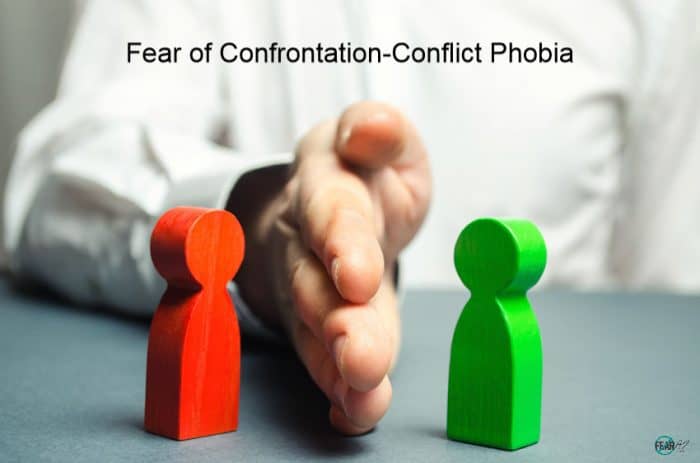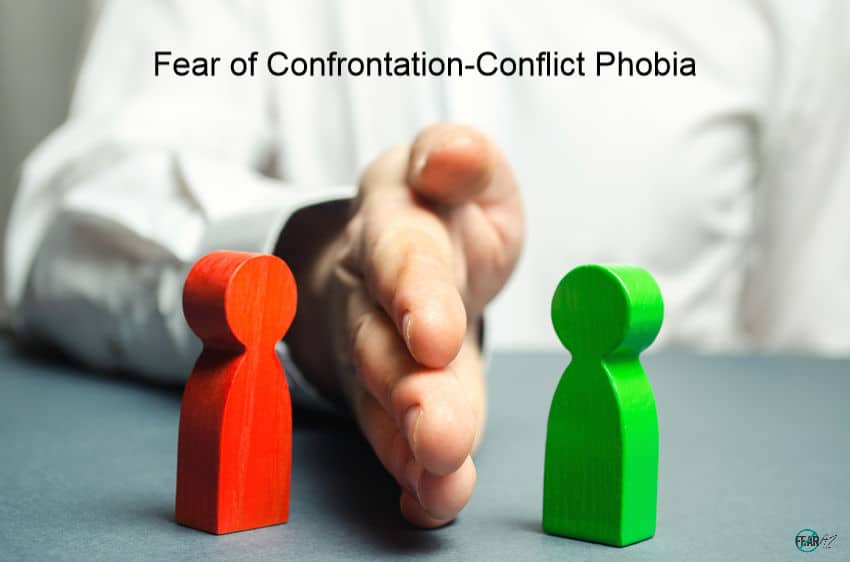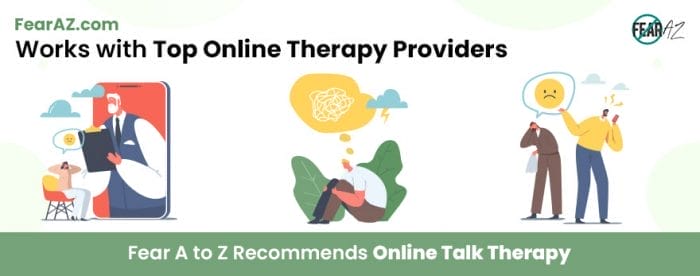Share This Article
Fear of Confrontation
When you find yourself in situations where you need to tell someone off, do you end up retreating?
When you need to speak up, do you find your mind going blank, your knees stiffening, and your palms growing sweaty? Do you often cave in and let others have their way in arguments?
The reason behind all of this may be a fear of confrontation.
Being wary or scared of conflicts is natural. But in your case, the fear is excessive, persistent, out of proportion to the risk. You feel helpless or not in control of your reactions to anxiety. You may be suffering from conflict phobia, an anxiety disorder.
Let’s get to know more about this medical condition.
What Is the Fear of Confrontation?
People who suffer from a conflict phobia have a morbid terror of either engaging in or witnessing a confrontation. Even the mere thought of a possibility of conflict causes distress.
If you have fear of confrontation phobia, your ideal world is one that is calm and serene, where everyone “gets along.” You tend to be overly cautious around other people. You worry too much about saying or doing things that other people might disagree with. You might do whatever it takes to prevent a confrontation, even to the point of lying. At the first sign of a conflict, you panic, run, and hide.

What Causes this Fear?
The fear could arise from thoughts such as “confrontation is bad” or “disagreeing is not a good habit.”
Environmental factors could cause phobia. For instance, growing up in a troubled home or having been subjected in the past to neglect, abuse, or violence could also be a probable cause. Having been exposed to an environment where adults fight in an unhealthy manner may also contribute to the development of phobia. You might also have seen the bad effects of a fallout. Simply put, the bad experience could have led the phobia sufferer to be oversensitive to conflicts and view all forms of confrontation as hazardous.
In a few cases, an individual brought up in a family where conflict, rejection or dislike was almost nonexistent could also develop the phobia. Because a confrontation might be something unfamiliar, this individual might feel overwhelmed.
Distressing events could also cause phobia. For instance, those with post-traumatic stress disorder (PTSD) have an increased risk to develop conflict phobia.
Some people also tend to be more vulnerable than others to developing phobia, such as those who have close relatives suffering from an anxiety disorder.
Symptoms of Conflict Phobia
Similar to other cases of phobia, people with conflict phobia are convinced that a confrontation could blow out of proportion and cause great and lasting harm.
Physical Symptoms
- Stammering
- Insomnia
- Diarrhea
- Nausea
- Accelerated breathing
- Headache or lightheadedness
Psychological Symptoms
When the phobia is triggered, a sufferer could display several different mental and physiological symptoms. These could include:
- Anxiety
- Sweating
- Panic attack
- Hyperventilating
- Shock
- Social anxiety
- Depression
- Nervous breakdown
- Inferiority complex
- Passive-aggressive behaviors
Overcoming Your Fear of Confrontation
First, work toward understanding why you believe confrontation is a bad thing. Did you have a trauma from childhood that made you think this way? Are you struggling with confidence in the place you are at now? Ask yourself questions that could help shed light on your condition.
Create a list of all the things you have lost out on as a result of not being able to speak for yourself. Letting people walk all over you must have had consequences. The condition could also take a toll on your confidence and quality of life. The list you make could help you understand your condition and then compel you to seek solutions.
Enroll in a class or read fear of confrontation books that teach personal boundaries. Learning how to set personal boundaries is a key ingredient in building healthy relationships.
Take small steps. Try speaking up for yourself, one scenario at a time. You might stammer or your voice might tremble in your initial attempts, and that’s okay. What’s important is you keep trying until you gradually get used to the practice.
Remove abusive people from your circle. Abusers and narcissists thrive among people pleasers who are scared of asserting boundaries. Be kind to yourself by kicking them out of your life!
Try yoga. Yoga poses are a great way to relieve stress and bring your body and mind together.
Visualize yourself confronting someone over something. Picture yourself as a person who is not afraid of articulating and explaining your viewpoints to others. In the image that you form in your head, you are calm and confident as you present your case.
Read up on healthy methods of confrontation. Know when it is ideal to engage in it, and when to avoid it.
Exercise to stay fit. Exercise also helps reduce anxiety and stress.
Cut down on caffeine, which can worsen anxiety symptoms.
Professional Help
When symptoms become extreme and the phobia starts to interfere with your life, getting treatment can help. Treatment could involve therapies or medication, or a combination of both.
Available fear of confrontation treatment methods include:
Exposure Therapy
In this treatment method, your medical provider will gradually expose you to the object of your fear: conflict. For instance, you and your medical provider might simulate a confrontation. Later on, your therapist will encourage you to apply in real-life scenarios the things you learn during your therapy sessions.
Hypnosis
This is an alternative form of medical therapy that involves the use of guided relaxation and focused attention, so patients can tap into their subconscious thoughts. The aim is to uncover the root of the phobia, and then use suggestions to direct the patients to healthy behaviors and thought patterns.
Cognitive Behavioral Therapy (CBT)
CBT is a popular treatment for phobic sufferers to help them address their harmful thought patterns and behavior. The aim is to replace these counterproductive thought patterns and behavior with new healthy ones. Modern CBT techniques even use virtual reality technology as a tool to expose patients to their object of fear, but in a safe and stable environment.
Tips for Coping with Conflict Phobia
It might be difficult, but somehow learn to step out of your comfort zone. Being timid could expose you to manipulation and abuse. You are your number one advocate: learn to step into your power and use it. You are a person with rights, which include speaking up whenever you see something questionable.
Overcoming your fear of conflict will not be for your benefit alone. It would also help people around you. You might have loved ones you need to defend or back up. By coping with your fear of confrontation, you’ll be able to give them appropriate support.
If you’ve decided to take a step forward to battle your phobia, remember to enlist the support of people you trust the most.
Don’t worry if your pace is slow. What’s important is your decision to continue.
As you cope with your phobia, you’ll notice an upgrade in your quality of life. Your relationships will also take a turn for the better when you learn to shun passive-aggressive tendencies and face issues head-on.
Recovery
Recovery is a long and hard journey. You can only finish it with commitment. You might struggle and falter at times, however, with commitment and the appropriate support, you will overcome conflict phobia.




